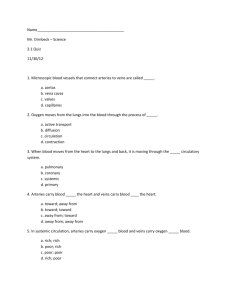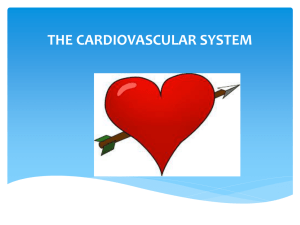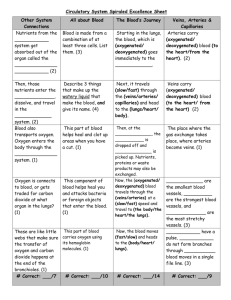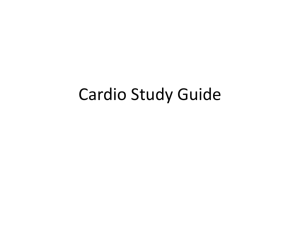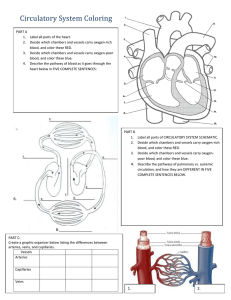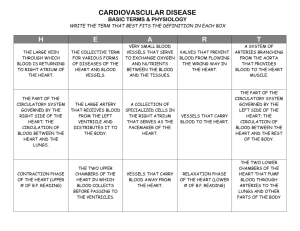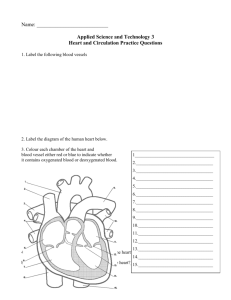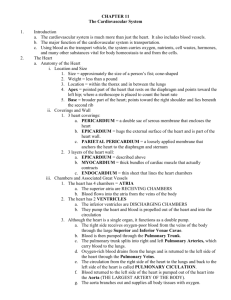Cardiovascular System
advertisement
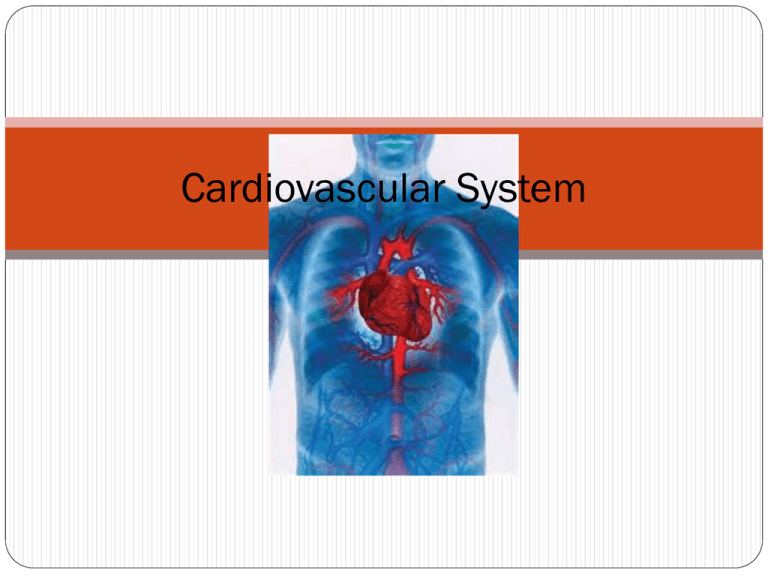
Cardiovascular System The components to this system Heart Blood vessels Blood Heart The heart is a hollow, cone-shaped muscular organ located behind and slightly to the left of the sternum or breastbone. Nestled between the lungs, the heart sits within a protective, bony cage formed by the sternum, ribs, and spine. The lower tip of the heart, called the apex, points toward the left hip and rests on the diaphragm (a membrane of muscle separating the chest cavity from the abdominal cavity). The upper portion of the heart, called the base, points toward the right shoulder and lies beneath the second rib. It is from the base that the major blood vessels of the body emerge. The heart is about the size of a clenched fist. At birth, an infant's heart and fist are about the same size. As a human body develops, the heart and fist grow at about the same rate. In adults, an average heart weighs between 9 and 11 ounces (255 and 310 grams). It is slightly larger in males than in females. Heart The heart is divided into four chambers. A muscular septum or partition divides it into a left and right side. Each side is further divided into an upper and lower chamber. The upper chambers, the atria are thin-walled. They are the receiving chambers of the heart. Blood flows into them from the body, which they then pump to the ventricles, the lower heart chambers. The ventricles are the discharging chambers of the heart. Their walls are thicker and contain more cardiac muscle than the walls of the atria. This enables the ventricles to contract and pump blood out of the heart to the lungs and the rest of the body. Pericardium Remember the pericardium – the enclosed sack that the heart is kept in. Major function, to prevents the heart from over expanding when blood volume increases. Do turtles have a pericardium??? I want you to figure this out today when you are in your dissection, be able to explain your reasoning. Blood Vessels The blood vessels form a closed transport system of tubes measuring about 60,000 miles (96,500 kilometers) in length—more than twice the distance around the equator of Earth. We are going to break blood vessels into arteries and veins. Arteries – Most carry blood away from the heart that is normally oxygenated. Veins - Most veins carry deoxygenated blood from the tissues back to the heart. Most??? The pulmonary vein is a large blood vessel that carries blood from the lungs to the left atrium of the heart. The pulmonary arteries, carry deoxygenated blood from the heart to the lungs. They are the only arteries that carry deoxygenated blood. Blood Blood is composed of blood cells suspended in a liquid called blood plasma. Plasma, which constitutes 55% of blood fluid, is mostly water (92% by volume). The blood cells present in blood are mainly red blood cells and white blood cells. The most common of the two are red blood cells contain hemoglobin, an iron-containing protein, which facilitates transportation of oxygen by reversibly binding to this respiratory gas and greatly increasing its solubility in blood. Get more into white blood cells when we get back into the immune system. Today/next class: Today we are going to start working on finishing the respiratory system and then continue on and remove the cardiovascular system on the turtles! You need to take out the ventricle, and both atriums, both aortas (largest artery in the body), and the right/left subclavical arteries. Then remove all veins that are attached including the ventral abdominal veins! When you are working on removing the system you need to focus on not disrupting the over systems and work out the veins, arteries and hearts attached together. You will have a quiz at the beginning of the period over the cardiovascular system, if your group gets finished early I want to see you studying the information that will be on the quiz. Clean up last 10 minutes of class
